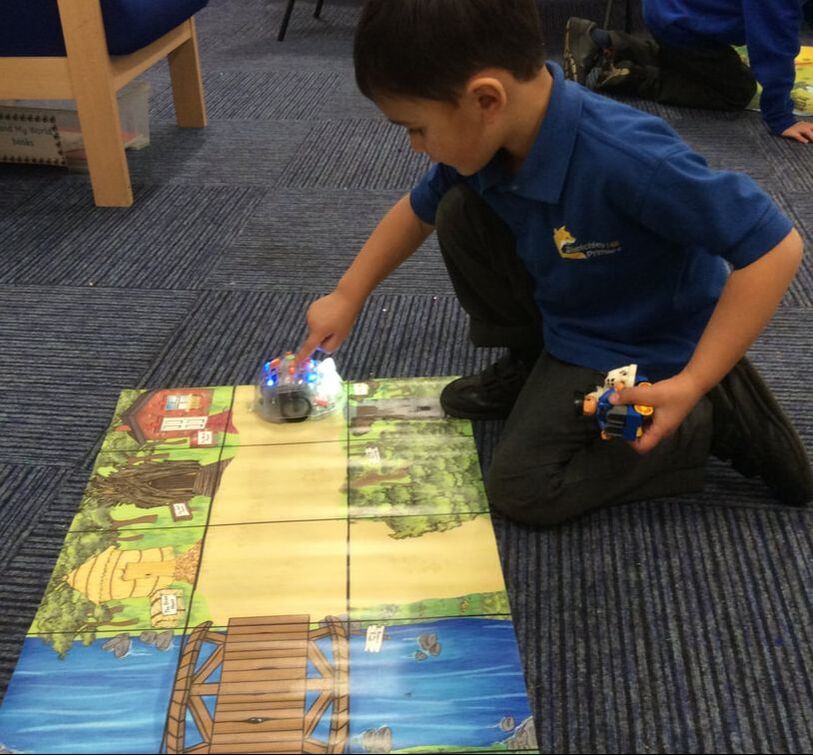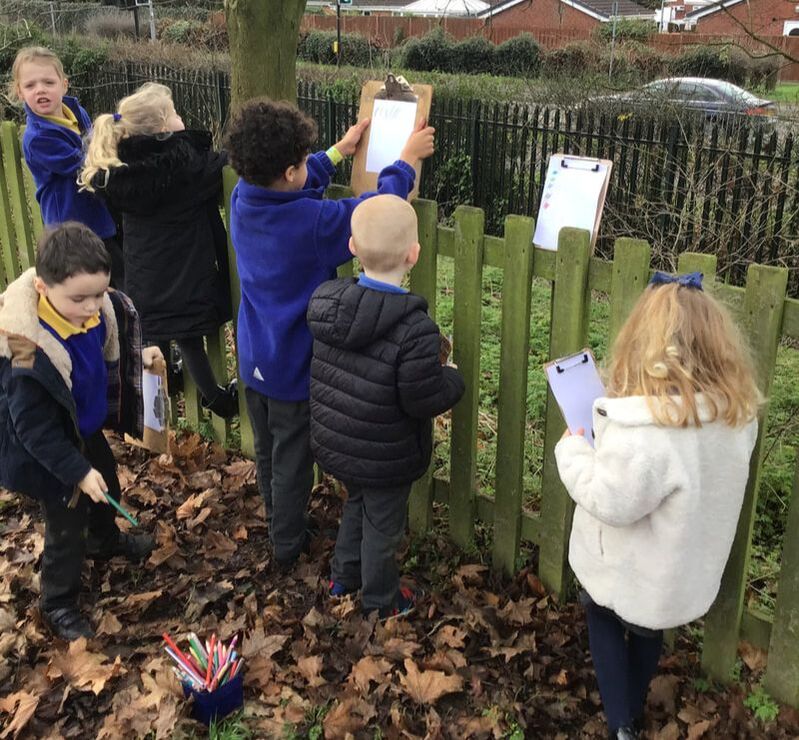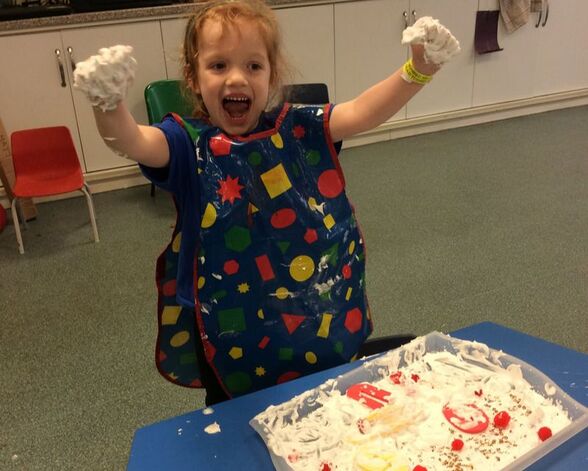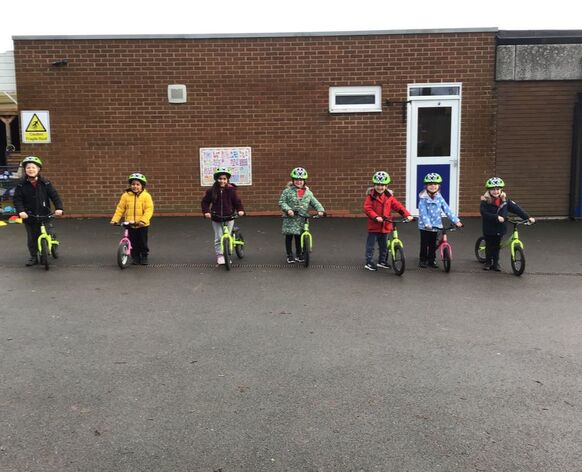|
Intent
The curriculum is intended to encourage the curiosity of the children so that they choose to explore and discover more and develop key skills in the process. In EYFS the curriculum is designed to recognise children’s prior learning from previous settings and their experiences at home, provide first hand learning experiences, whilst allowing the children to build resilience, curiosity and independence. Every child is recognised as a unique individual and we celebrate and welcome differences within our school community. The ability to learn is underpinned by the teaching of basic skills, knowledge, concepts and values. We provide enhancement opportunities to engage learning and believe that our first experiences of school should be happy and positive, enabling us to develop a lifelong love of learning. Throughout their time in EYFS, the children develop the confidence and skills to make decisions and self-evaluate, make connections and show tolerance, respect and self-control in order to thrive in their community. |
Implementation
The knowledge and skills we teach are set out in Development Matters: Non-statutory curriculum guidance for the Early Years Foundation Stage and in the Educational Programmes of the Statutory Framework for the Early Years Foundation Stage (both: DfE, 2021). We set these out in a sequence of learning (age-related expectations) with some additional/explicit learning according to children’s interests and our own curriculum, linked to The National Curriculum in England (DfE, 2013). Communication is a key aspect: ‘High-quality early years education, with a strong focus on communication, is good for every child’. Challenge is also important: ‘The curriculum needs to be ambitious… Depth in early learning is much more important than covering lots of things in a superficial way’ (both: Development Matters, DfE, 2021). Reading is at the heart of our curriculum. Children follow the rigorous and highly successful Read, Write Inc program faithfully so that they meet good outcomes for reading with almost all children passing the Year One phonics screening. Our aim is to encourage a love of reading right from the start and each topic is driven by a carefully selected range of high quality texts. These texts not only develop a love of reading, but have been chosen specifically to develop their oracy, vocabulary and comprehension. The curriculum is organised in the same way as it is in the rest of the school where the learning is taught through an umbrella theme which takes the form of a question. These are linked most closely to the UTW element. This is not to suggest that this element is the most important, rather that the themes lend themselves to making links and developing key skills. Within each theme there are opportunities for the children to develop their own lines of enquiry and at times discreet lessons will be necessary. Skill development tasks are planned to supplement the continuous provision. Although the title of the theme is set on the long term plan, the order of the weekly plans may vary as special occasions, festivals and spontaneous moments of wonder will undoubtedly occur and must be investigated. We ensure children have opportunities to embed their learning and to further develop their own lines of enquiry within the continuous provision. Key knowledge and skills development is carefully planned throughout the year to ensure nothing is left to chance as children lead their own learning within the continuous provision. |
Impact
Our curriculum needs to meet the needs of all our children, including our disadvantaged pupils and those with SEND, so we spend time looking at and evaluating how children are learning. This is achieved through talking to children, We use this information on a weekly basis to plan learning experiences and next steps so that knowledge and skills are built cumulatively. During each assessment window, three times a year, teachers update the progress children have made onto SIMS which allows us to assess the impact of teaching and enables us to measure our starting points against a national data set. Evidence of children’s learning including work samples and photographs and other relevant contributions are kept in paper ‘learning journals’. Our curriculum and its delivery ensure that children make good progress. During their time in our EYFS, children make good progress so that we meet the national expectation for GLD at the end of the year. Pupils also make good progress toward all their Early Learning Goals before transitioning into Year One. We believe our high standards are due to the enriched play-based exploration alongside the rigour of assessment and teaching the children have as they move through the early years – a rich diet of balanced learning experiences is undoubtedly the best way to develop happy, curious children. At Sketchley Hill we want the children to be resilient and inquisitive learners who are socially aware and enjoy being part of a vibrant community. |
|
Term 1 is from a local viewpoint, focussing on the children themselves and their own prior learning and experiences. Effective Characteristics of Learning are modelled by the adults and the foundations for learning are set through PSHE and Communication and Language based activities in the Continuous Provision alongside phonics and maths teaching. Activities are modelled and children are encouraged to copy the process and final outcome. Must do activities are introduced this term in order to encourage children to practise new skills independently. The number of must do’s increases each term as does the level of independence.
|
Term 2 builds on this to encourage the children to start to take a wider view of their environment and ask questions about it. We find out how we know about the past and how things work and the children start to practise their skills more independently. The Core Areas of Learning are starting to be supported with reading , writing and maths activities. The activities are modelled and the children are encouraged to produce their own version.
|
Term 3 is a consolidation of skills as the focus expands further to look at the wider world; in particular the animals and their habitats. The children are applying what they have learned independently and choosing to extend it through reading, writing and maths as well as creative means. Children are shown an example or stimulus for an activity and can then choose their own way of doing it. The number of must do activities in the week increases and some whole class sessions are introduced in preparation for Year 1.
|
Please click on the links below to access the current Curriculum Notes to help with the childrens' learning.
|
Autumn 1
|
Autumn 2
|
Spring 1
|
Spring 2
|
Summer 1
|
Summer 2
|
|
Communication and Language
The development of children’s spoken language underpins all seven areas of learning and development. Children’s back-and-forth interactions from an early age form the foundations for language and cognitive development. The number and quality of the conversations they have with adults and peers throughout the day in a language-rich environment is crucial. By commenting on what children are interested in or doing, and echoing back what they say with new vocabulary added, practitioners will build children's language effectively. Reading frequently to children, and engaging them actively in stories, non-fiction, rhymes and poems, and then providing them with extensive opportunities to use and embed new words in a range of contexts, will give children the opportunity to thrive. Through conversation, story-telling and role play, where children share their ideas with support and modelling from their teacher, and sensitive questioning that invites them to elaborate, children become comfortable using a rich range of vocabulary and language structures.
|
Personal, Social and Emotional Development
Children’s personal, social and emotional development (PSED) is crucial for children to lead healthy and happy lives, and is fundamental to their cognitive development. Underpinning their personal development are the important attachments that shape their social world. Strong, warm and supportive relationships with adults enable children to learn how to understand their own feelings and those of others. Children should be supported to manage emotions, develop a positive sense of self, set themselves simple goals, have confidence in their own abilities, to persist and wait for what they want and direct attention as necessary. Through adult modelling and guidance, they will learn how to look after their bodies, including healthy eating, and manage personal needs independently. Through supported interaction with other children, they learn how to make good friendships, co-operate and resolve conflicts peaceably. These attributes will provide a secure platform from which children can achieve at school and in later life
|
Physical
Development Physical activity is vital in children’s all-round development, enabling them to pursue happy, healthy and active lives. Gross and fine motor experiences develop incrementally throughout early childhood, starting with sensory explorations and the development of a child’s strength, co-ordination and positional awareness through tummy time, crawling and play movement with both objects and adults. By creating games and providing opportunities for play both indoors and outdoors, adults can support children to develop their core strength, stability, balance, spatial awareness, co-ordination and agility. Gross motor skills provide the foundation for developing healthy bodies and social and emotional well-being. Fine motor control and precision helps with hand-eye co-ordination, which is later linked to early literacy. Repeated and varied opportunities to explore and play with small world activities, puzzles, arts and crafts and the practice of using small tools, with feedback and support from adults, allow children to develop proficiency, control and confidence.
|
|
Literacy
|
Mathematics
|
Understanding the World
|
|
It is crucial for children to develop a life-long love of reading. Reading consists of two dimensions: language comprehension and word reading. Language comprehension (necessary for both reading and writing) starts from birth. It only develops when adults talk with children about the world around them and the books (stories and non-fiction) they read with them, and enjoy rhymes, poems and songs together. Skilled word reading, taught later, involves both the speedy working out of the pronunciation of unfamiliar printed words (decoding) and the speedy recognition of familiar printed words. Writing involves transcription (spelling and handwriting) and composition (articulating ideas and structuring them in speech, before writing).
|
Developing a strong grounding in number is essential so that all children develop the necessary building blocks to excel mathematically. Children should be able to count confidently, develop a deep understanding of the numbers to 10, the relationships between them and the patterns within those numbers. By providing frequent and varied opportunities to build and apply this understanding - such as using manipulatives, including small pebbles and tens frames for organising counting - children will develop a secure base of knowledge and vocabulary from which mastery of mathematics is built. In addition, it is important that the curriculum includes rich opportunities for children to develop their spatial reasoning skills across all areas of mathematics including shape, space and measures. It is important that children develop positive attitudes and interests in mathematics, look for patterns and relationships, spot connections, ‘have a go’, talk to adults and peers about what they notice and not be afraid to make mistakes.
|
Understanding the world involves guiding children to make sense of their physical world and their community. The frequency and range of children’s personal experiences increases their knowledge and sense of the world around them – from visiting parks, libraries and museums to meeting important members of society such as police officers, nurses and firefighters. In addition, listening to a broad selection of stories, non-fiction, rhymes and poems will foster their understanding of our culturally, socially, technologically and ecologically diverse world. As well as building important knowledge, this extends their familiarity with words that support understanding across domains. Enriching and widening children’s vocabulary will support later reading comprehension.
|
Expressive Arts and Design
The development of children’s artistic and cultural awareness supports their imagination and creativity. It is important that children have regular opportunities to engage with the arts, enabling them to explore and play with a wide range of media and materials. The quality and variety of what children see, hear and participate in is crucial for developing their understanding, self-expression, vocabulary and ability to communicate through the arts. The frequency, repetition and depth of their experiences are fundamental to their progress in interpreting and appreciating what they hear, respond to and observe.
These school schemes are a progression from the Foundation Stage Curriculum
|
Computing
|
|
PSHCE
|









